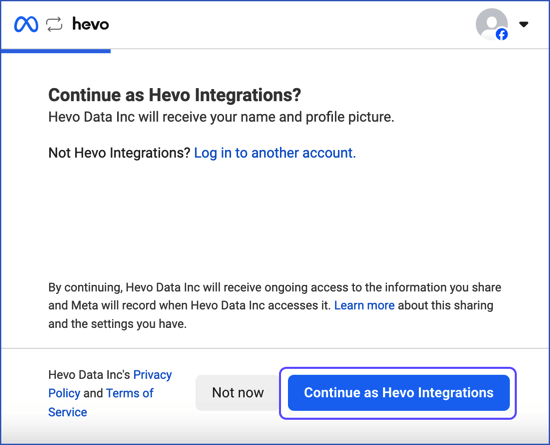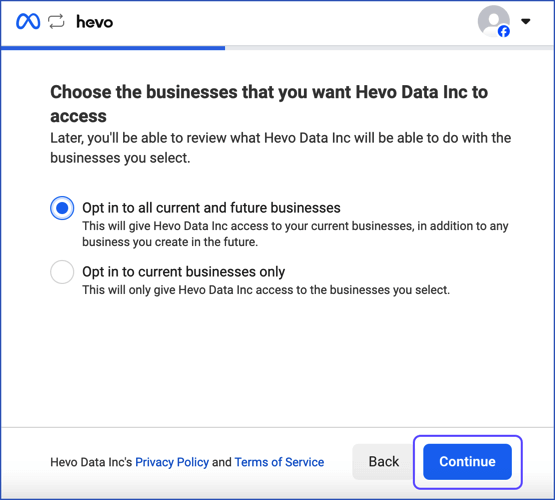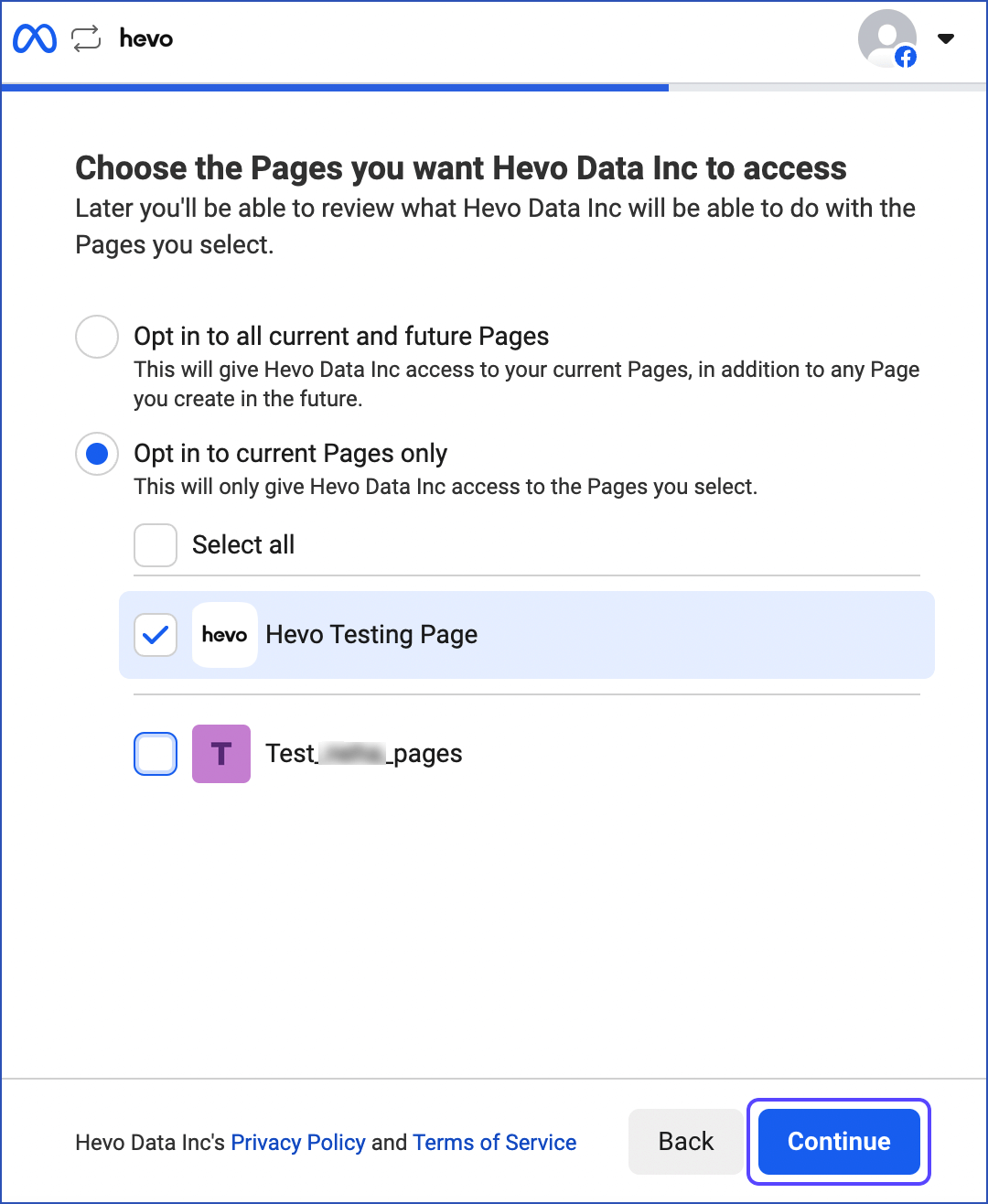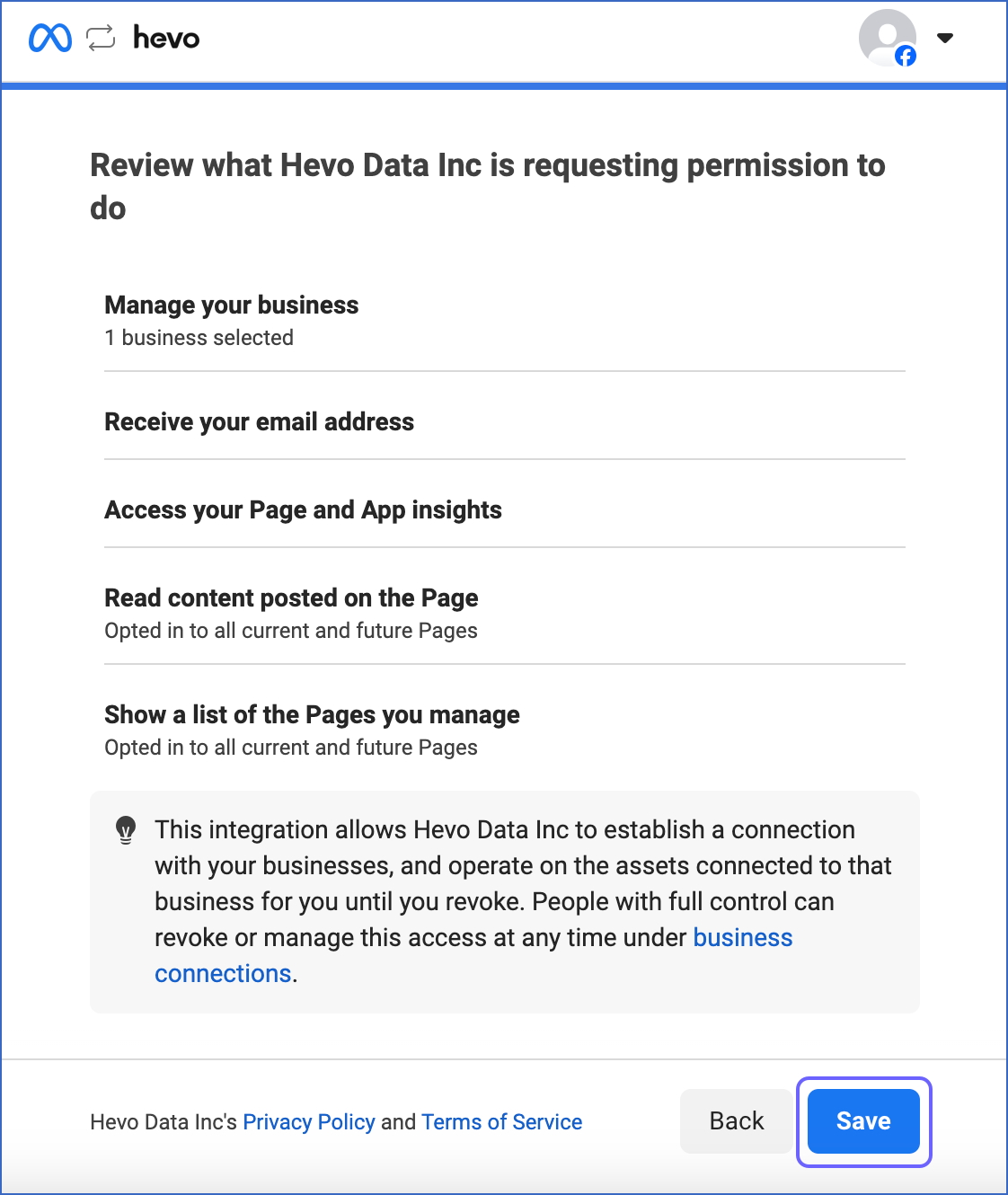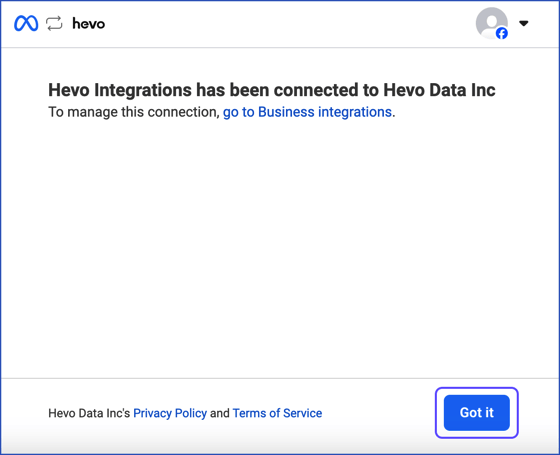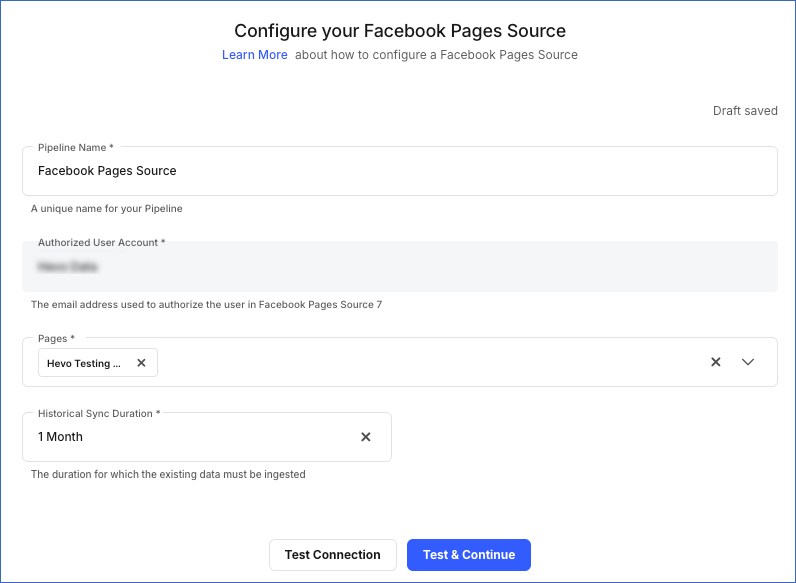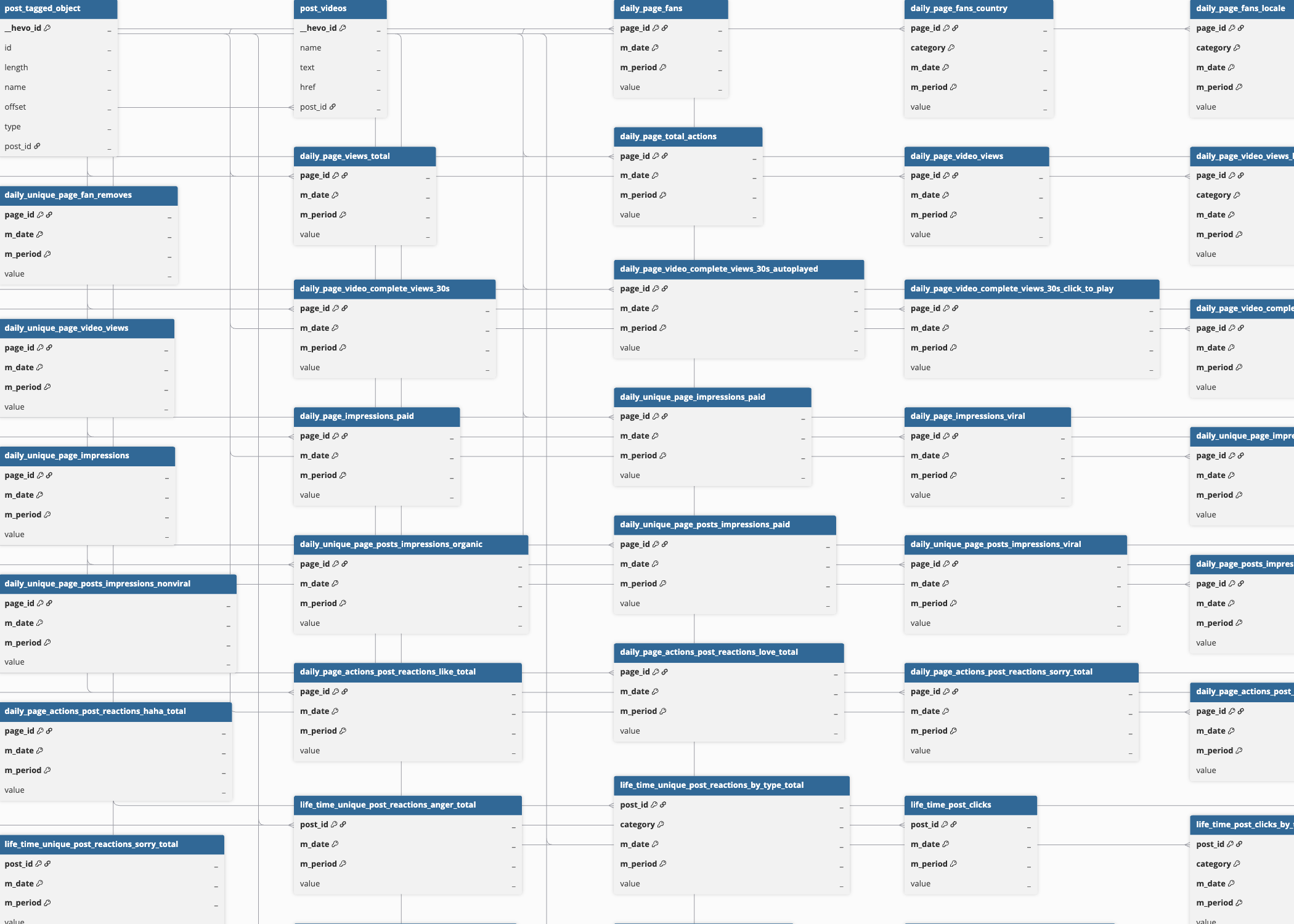Effective November 15, 2025, Meta deprecated multiple Facebook Pages and Post Insights metrics. These metrics are no longer supported by the Facebook Pages API. As a result, Hevo no longer ingests the following metrics, and any Destination tables or columns based on these metrics will no longer be updated for new data.
From Release 2.45 onwards, Hevo uses the supported replacement metrics provided by Meta to continue ingesting equivalent insights wherever possible.
The following table lists the deprecated Facebook Pages and Post Insights metrics and the supported replacement metrics now used by Hevo.
| Object | Metrics | Replacement Metrics |
|---|---|---|
| Page Fans | page_fans, page_fans_city, page_fans_country, page_fans_locale, page_fan_adds, page_fan_adds_unique, page_fan_adds_by_paid_non_paid_unique, page_fan_removes, page_fan_removes_unique | page_follows, page_follows_city, page_follows_country |
| Page Impressions | page_impressions, page_impressions_unique, page_impressions_paid, page_impressions_paid_unique, page_impressions_viral, page_impressions_viral_unique, page_impressions_nonviral, page_impressions_nonviral_unique | page_media_view |
| Page Posts Impressions | page_posts_impressions, page_posts_impressions_unique, page_posts_impressions_paid, page_posts_impressions_paid_unique, page_posts_impressions_organic, page_posts_impressions_organic_unique, page_posts_impressions_viral, page_posts_impressions_viral_unique, page_posts_impressions_nonviral, page_posts_impressions_nonviral_unique, page_posts_served_impressions_organic_unique | page_media_view |
| Post Info | post_impressions, post_impressions_unique, post_impressions_paid, post_impressions_paid_unique, post_impressions_organic, post_impressions_organic_unique, post_impressions_viral, post_impressions_viral_unique, post_impressions_nonviral, post_impressions_nonviral_unique, post_impressions_fan, post_impressions_fan_unique | page_media_view |
For detailed information on all affected metrics and their fields, refer to the Schema and Primary Keys section.
Note:
- Historical data already ingested into your Destination tables is not affected.
- Core Page and Post objects are not affected by this update.
Facebook Pages uses Facebook’s Marketing API to fetch insights data for a Facebook page as a whole (such as followers and impressions), and for page posts (such as likes, shares, comments, and video plays). You can replicate the data of one or multiple Facebook pages, including details such as posting and activity history, page insights including page views, post impressions, and insights on posted stories or Ads to a Destination database or data warehouse using Hevo Pipelines.
The Facebook Pages admin user must authorize Hevo to access the Facebook Pages APIs for reading the page and posts-related insights data for the selected pages.
Note: The data is ingested only for posts made by the page owner.
Limitations
-
All page data is limited to the past two years due to Facebook Pages API limitations.
Note: To fetch data for
daily_pageorunique_pagemetrics for a period more than three months, change the position of the object to any past date up till two years from the current date, in the Pipeline Overview page. -
Hevo does not load data from a column into the Destination table if its size exceeds 16 MB, and skips the Event if it exceeds 40 MB. If the Event contains a column larger than 16 MB, Hevo attempts to load the Event after dropping that column’s data. However, if the Event size still exceeds 40 MB, then the Event is also dropped. As a result, you may see discrepancies between your Source and Destination data. To avoid such a scenario, ensure that each Event contains less than 40 MB of data.
Revision History
Refer to the following table for the list of key updates made to this page:
| Date | Release | Description of Change |
|---|---|---|
| Feb-09-2026 | 2.45 | Updated the warning container in the overview section to inform about the deprecation of Page and Post Insights metrics. |
| Nov-07-2025 | NA | Updated the document as per the latest Hevo UI. |
| Sep-18-2025 | NA | Updated section, Configuring Facebook Pages as a Source as per the latest UI. |
| Sep-01-2025 | 2.39.3 | Updated the warning container in the overview section to inform about the upgrade to Marketing API v23.0. |
| Jul-07-2025 | NA | Updated the Limitations section to inform about the max record and column size in an Event. |
| Jan-07-2025 | NA | Updated the Limitations section to add information on Event size. |
| Jan-06-2025 | 2.31.2 | Updated the warning container in the page overview to include information about the upgrade to Marketing API v21.0. |
| Nov-05-2024 | NA | Added a note in the Configuring Facebook Pages as a Source section to indicate that enabling Advanced Protection requires reauthorizing Hevo for existing Pipelines. |
| Aug-29-2024 | NA | Updated section, Limitations to remove the limitation on ingesting post data and metrics only from the last 90 days. |
| Jul-01-2024 | 2.25 | Updated the page overview to: - Add a warning container to inform about the upgrade to Marketing API v19.0, - Remove the note about the upgrade to Marketing API v18.0. |
| Mar-05-2024 | 2.21 | Updated the ingestion frequency table in the Data Replication section. |
| Jan-29-2024 | 2.19.3 | Added a note in the page overview about the Marketing API v18.0 update. |
| Oct-03-2023 | NA | Updated the se |
| Oct-03-2023 | NA | Updated the section, Configuring Facebook Pages as a Source as per the latest Facebook UI. |
| Feb-20-2023 | NA | Updated section, Configuring Facebook Pages as a Source to update the information about historical sync duration. |
| Sep-05-2022 | NA | Updated section, Data Replication to reorganize the content for better understanding and coherence. |
| Dec-06-2021 | 1.77 | Updated the Data Model section to correct the definitions of Lifetime Post Metrics and Unique Page Metrics. |
| Oct-25-2021 | NA | Added the Pipeline frequency information in the Data Replication section. |
| Jul-26-2021 | NA | Added a note in the Overview section about Hevo providing a fully-managed Google BigQuery Destination for Pipelines created with this Source. |

